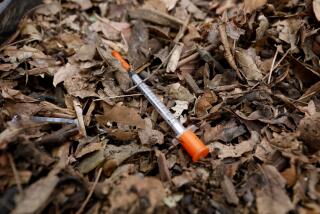Needle Exchanges Can Be a Path to Promote Racial Healing
- Share via
In response to President Clinton’s mission to promote racial healing, Americans of all backgrounds have expressed hope for bridging the racial divide and preventing race relations from becoming, in his words, a “powder keg of problems.”
In the African American community, the epidemic of injection-related AIDS cases cries out for healing of the literal kind.
AIDS is the No. 1 killer of blacks between 25 and 44. Half of those deaths can be traced to intravenous drug use. Science tells us that needle exchange is effective prevention, yet national and state legislation currently prevents its widespread adoption.
As of December 1996, 32% of the 573,000 reported AIDS cases in the U.S. were linked to injected drugs; 100,000 of them were African Americans. Needle use is the primary source of transmission among heterosexuals and accounts for about 90% of AIDS cases among women. By the end of 1996, 29,700 black women had injection-related AIDS or had died from it.
Injection drug use is also responsible for the majority of cases involving HIV transmission between mothers and their infants. Of the 6,891 pediatric AIDS cases related to a mother with or at risk of HIV injection, 59% were related to injection drug use. For a host of reasons, injection-related HIV transmission disproportionately affects the African American community.
Policymakers have traditionally cited strong anti-drug sentiments within the black community as reasons to shy away from needle exchange legislation. But in this rare instance, politicians aren’t looking closely enough at the polls.
Sixty-six percent of all Americans and 69% of African Americans are in favor of needle exchange programs, according to a 1996 Kaiser Family Foundation survey. A preponderance of scientific data backs them up:
* A Yale University study of a needle exchange program in New Haven estimates that in the first eight months of operation, the program reduced new HIV infections by 33%.
* Needle exchange programs have been shown to reduce needle sharing by 80%, cutting down the number of contaminated needles in circulation.
* Needle exchange programs do not attract new drug users nor do they increase the frequency of injection among program participants.
To make needle exchange programs a key component of our national AIDS prevention strategy, we must lift the federal ban on funding. Currently there are only 117 programs operating in 72 cities. Many of them must depend on volunteers.
We need to establish needle exchange pilot projects in the 10 states, including California, where the furnishing, possession or use of hypodermic needles or syringes without a prescription is now criminalized. A bill I am sponsoring would allow pharmacists, physicians and other authorized individuals to provide injection equipment without a prescription in targeted California cities.
President Clinton and legislators who who want to do the right thing for race relations and the black community would do well to listen to what African Americans and the majority of Americans have to say: Lift legislative restrictions on needle exchange now. The best way to prevent a powder keg from exploding is to snuff the fuse.
More to Read
Sign up for Essential California
The most important California stories and recommendations in your inbox every morning.
You may occasionally receive promotional content from the Los Angeles Times.













